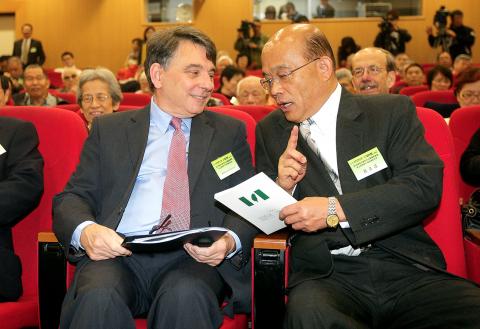Former American Institute in Taiwan (AIT) director William Stanton yesterday took issue with opinion polls showing that a majority of Taiwanese prefer maintaining the “status quo” in dealings with China.
Taiwan is actually increasingly leaning toward China, he said, and the “status quo,” as perceived by Taiwanese, was “problematic” and “an illusion,” given that China is growing ever stronger and Taiwan is increasingly dependent on China economically.
Taiwanese cannot unilaterally decide the development of cross-strait ties, Stanton said at the annual meeting of the World Taiwanese Congress in Taipei, adding that how much patience China shows toward maintaining the “status quo” remains a question if bilateral relations do not proceed the way China sees fit.

Photo: CNA
Pro-unification advocates often think of themselves as realists and say Taiwan has no choice other than uniting with China, and they optimistically imagine that with time and the model that Taiwan provides, it would ultimately produce a beneficial influence over China, Stanton said.
However, the Chinese Communist Party has given no indication that it would actually support democracy or brook any challenge to its authoritarian rule, Stanton said.
Moreover, although China’s economy is stronger than ever, it has also brought with it a rekindling of nationalism, expansionism and a hawkish mindset, he said.
Taiwan should develop a broader and more in-depth understanding of what challenges its national security faces, and re-examine its national defense budget, he said.
The declining support for national security may stem from the falling morale of its armed forces, he added.
Taiwan should strengthen and invest more in national defense, while reducing market protectionism, Stanton said, adding that Taiwan should adopt measures that would increase its appeal to foreign investors, as well as step up processes to set up free-trade agreements with other nations.

DAREDEVIL: Honnold said it had always been a dream of his to climb Taipei 101, while a Netflix producer said the skyscraper was ‘a real icon of this country’ US climber Alex Honnold yesterday took on Taiwan’s tallest building, becoming the first person to scale Taipei 101 without a rope, harness or safety net. Hundreds of spectators gathered at the base of the 101-story skyscraper to watch Honnold, 40, embark on his daredevil feat, which was also broadcast live on Netflix. Dressed in a red T-shirt and yellow custom-made climbing shoes, Honnold swiftly moved up the southeast face of the glass and steel building. At one point, he stepped onto a platform midway up to wave down at fans and onlookers who were taking photos. People watching from inside

A Vietnamese migrant worker yesterday won NT$12 million (US$379,627) on a Lunar New Year scratch card in Kaohsiung as part of Taiwan Lottery Co’s (台灣彩券) “NT$12 Million Grand Fortune” (1200萬大吉利) game. The man was the first top-prize winner of the new game launched on Jan. 6 to mark the Lunar New Year. Three Vietnamese migrant workers visited a Taiwan Lottery shop on Xinyue Street in Kaohsiung’s Gangshan District (崗山), a store representative said. The player bought multiple tickets and, after winning nothing, held the final lottery ticket in one hand and rubbed the store’s statue of the Maitreya Buddha’s belly with the other,

‘NATO-PLUS’: ‘Our strategic partners in the Indo-Pacific are facing increasing aggression by the Chinese Communist Party,’ US Representative Rob Wittman said The US House of Representatives on Monday released its version of the Consolidated Appropriations Act, which includes US$1.15 billion to support security cooperation with Taiwan. The omnibus act, covering US$1.2 trillion of spending, allocates US$1 billion for the Taiwan Security Cooperation Initiative, as well as US$150 million for the replacement of defense articles and reimbursement of defense services provided to Taiwan. The fund allocations were based on the US National Defense Authorization Act for fiscal 2026 that was passed by the US Congress last month and authorized up to US$1 billion to the US Defense Security Cooperation Agency in support of the

‘COMMITTED TO DETERRENCE’: Washington would stand by its allies, but it can only help as much as countries help themselves, Raymond Greene said The US is committed to deterrence in the first island chain, but it should not bear the burden alone, as “freedom is not free,” American Institute in Taiwan Director Raymond Greene said in a speech at the Institute for National Defense and Security Research’s “Strengthening Resilience: Defense as the Engine of Development” seminar in Taipei yesterday. In the speech, titled “Investing Together and a Secure and Prosperous Future,” Greene highlighted the contributions of US President Donald Trump’s administration to Taiwan’s defense efforts, including the establishment of supply chains for drones and autonomous systems, offers of security assistance and the expansion of